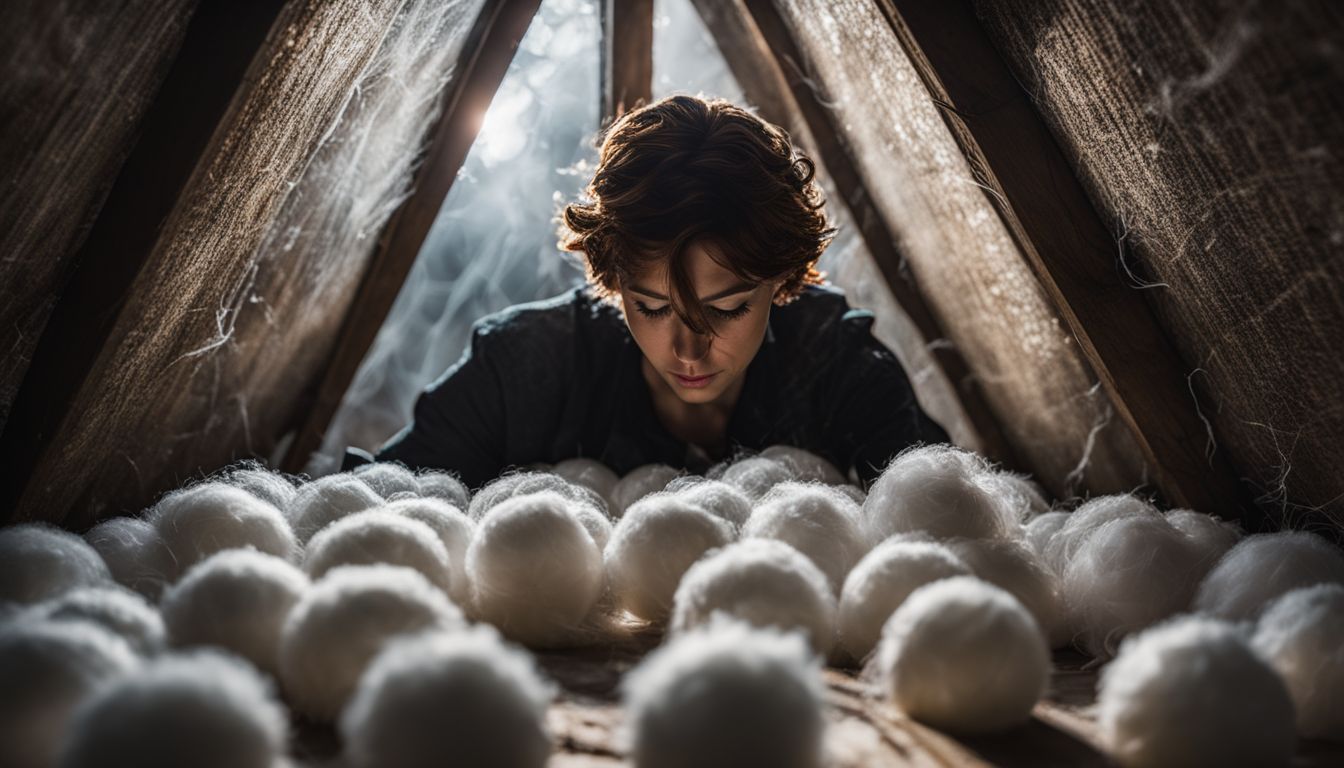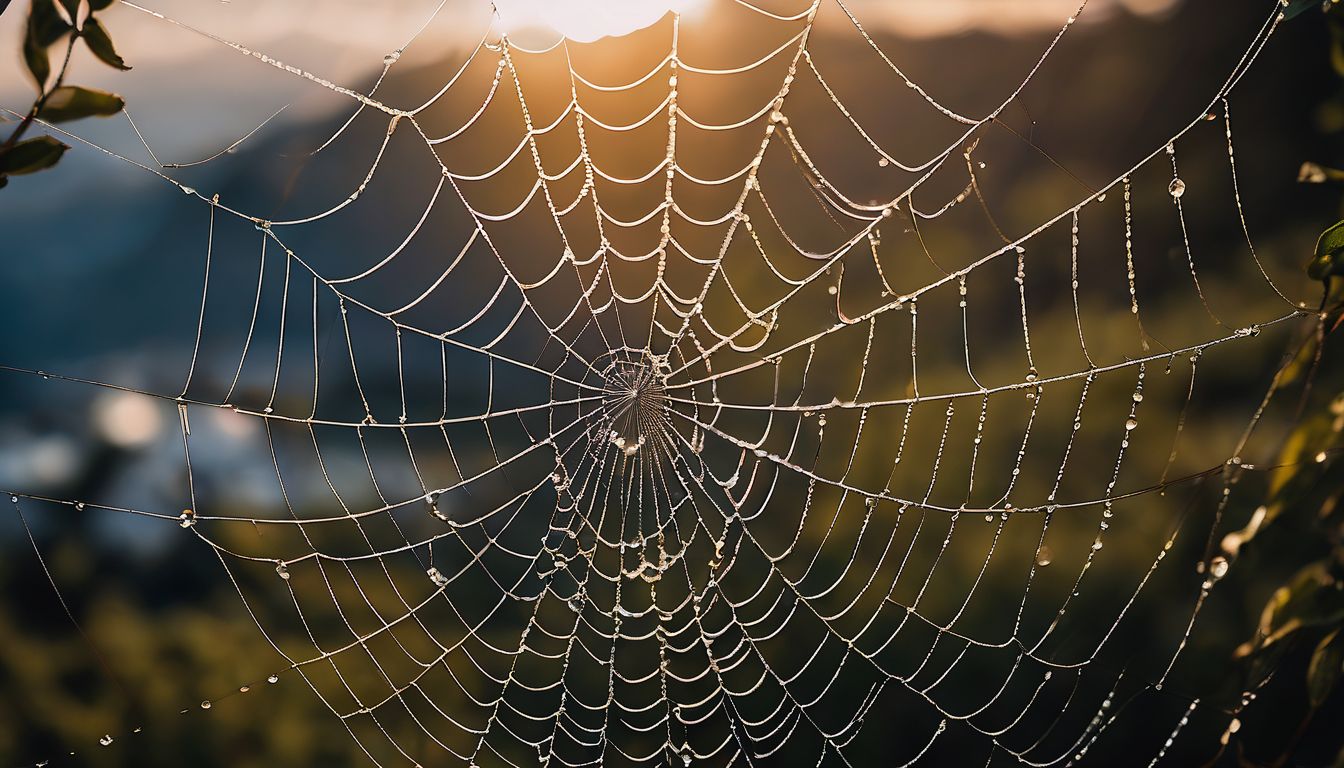Are spiders spinning webs in every corner of your home? Mothballs are often touted as a simple fix for such creepy crawlers. This article unravels the facts and myths surrounding mothballs as a spider repellent, guiding you to make an informed choice.
Stay tuned — the truth might surprise you!
Key Takeaways
- Mothballs are not specifically designed to repel spiders, and using them for this purpose can pose health risks due to their toxic nature.
- Scientific evidence suggests that mothballs may deter certain insects through the release of a strong odor but are not effective at keeping spiders away.
- Safer alternatives to mothballs for spider control include natural repellents such as essential oils, vinegar, or citrus peels, as well as seeking professional pest control services for severe infestations.
Understanding Mothballs: What Are They?

Mothballs are small balls made of pesticide chemicals, such as naphthalene or paradichlorobenzene, that are traditionally used to repel moths and other insects. They work by releasing a toxic vapor that deters pests from infesting clothing and other stored items.
The Basics of Mothballs
Mothballs are small, strong-smelling balls used to protect clothes from being eaten by moths and their babies. They work well for keeping your cozy wool sweaters safe. These little white balls have chemicals in them that can stop bugs like silverfish too.
But it’s important to know that they’re not meant to be used outside. If you put mothballs out in the yard, they could hurt plants and animals and make the air dirty.
People use these pest control helpers mainly for things made of natural fibers. While some folks think mothballs can guard against many pests, they were really made just for moths.
It’s also good to remember that mothballs have something called naphthalene inside them. This stuff kills insects but can also be bad for people if there’s too much around.
The Myth Explored: Do Mothballs Keep Spiders Away?

Mothballs as a Traditional Repellent
– The Effectiveness of Mothballs Against Spiders
Interested in knowing if mothballs really keep spiders away? Keep on reading to uncover the truth!
Mothballs as a Traditional Repellent
People have used moth balls for years to keep bugs away. They think these small, smelly balls can stop all sorts of pests. But this is not what moth balls are made for. Their real job is to protect clothes from moths not spiders or mice.
It’s a common mistake to use them for other bugs.
Some folks believe that the strong scent scares spiders off. This is why they put the balls in corners or closets where spiders might live. However, no good proof shows that moth balls actually make spiders stay away.
In fact, using them like this can be risky because they are toxic and could harm people if breathed in too much.
The Effectiveness of Mothballs Against Spiders
Mothballs have been used for years to keep pests away. Many believe these small, smelly balls can also chase off spiders. Mothballs do work against some insects and animals, but their power over spiders isn’t clear-cut.
Using mothballs might seem like a good idea to stop spiders from coming near your clothes and other items. They give off a gas that can make pests stay away or even get stuck in place.
This could help prevent spiders in certain spots where you put the mothballs. Remember though; while they might not kill spiders directly, their strong odor acts as a barrier. However, it’s always smart to look into safer options since mothballs come with risks due to their toxic nature.
The Truth About Mothballs and Spider Repellent
Scientific evidence on mothballs as a deterrent and potential risks and toxicity concerns. Learn the truth about using mothballs to keep spiders away!
Scientific Evidence on Mothballs as a Deterrent
Studies have shown that mothballs can repel certain insects due to the strong odor they release. This pungent scent deters moths and some other pests, including spiders, from infesting an area.
However, it’s essential to handle mothballs with caution as they contain toxic chemicals that can be harmful to humans and pets if not used properly. Mothballs are not intended for outdoor use or as a spider deterrent but should only be used in sealed containers within enclosed spaces like closets.
The active ingredient in mothballs, paradichlorobenzene or naphthalene, is what gives them their repellent properties. Nevertheless, using them as a spider repellent may pose health risks without effectively solving the problem long-term.
Potential Risks and Toxicity Concerns
Now let’s talk about the potential risks and toxicity concerns associated with using mothballs. It’s crucial to understand that these seemingly harmless balls contain toxic chemicals that can be harmful to humans and pets, particularly if ingested or inhaled.
Mothballs release harmful vapors as they break down, posing health risks to those who breathe in the fumes. Moreover, illegal naphthalene moth repellent products like mothballs are especially hazardous for young children and can lead to serious kidney and liver damage in pets if accidentally consumed.
The chemicals present in mothballs pose a threat as they volatilize easily, increasing the risk of harm due to inhalation. These facts emphasize the importance of seeking alternative methods for pest control that don’t carry such significant health hazards.
Can Spiders Sense Danger from Mothballs?
Spiders cannot sense danger from mothballs. They don’t have the ability to smell or perceive the toxic chemicals in mothballs as harmful. The idea that spiders can be repelled by mothballs is not supported by scientific evidence.
Mothballs contain chemicals that are dangerous to humans and pets, but they do not effectively deter spiders. The old wives’ tale about using mothballs to keep spiders away is just a myth with no basis in reality.
Moving on to Alternatives to Mothballs for Spider Control..
Alternatives to Mothballs for Spider Control
Consider using natural spider repellents such as essential oils, vinegar, or citrus peels. If the infestation is severe, seek professional pest control options to effectively eliminate spiders from your home.
Natural Spider Repellents
To keep spiders away without using mothballs, try natural spider repellents. These are safe and effective alternatives to traditional chemicals. Here are some options to consider:
- Lemon oil: Its strong scent repels spiders, and it’s safe for indoor use.
- Peppermint oil: Spiders dislike the strong smell of peppermint, making it an effective repellent.
- Chestnut-fruits: Certain compounds in chestnuts have been found to repel female spiders, making them a natural deterrent.
- Cinnamon: Sprinkling cinnamon powder in areas where spiders frequent can discourage them from settling in those spots.
- Tea tree: The potent aroma of tea tree oil acts as a natural spider repellent, keeping them at bay.
Professional Pest Control Options
Professional pest control services offer safe and effective solutions for controlling spider infestations in your home or business. Here are some reliable options to consider:
- Inspection: A professional pest control technician will conduct a thorough inspection of your property to identify the type of spiders and their hiding spots.
- Treatment Plan: Based on the inspection findings, the technician will develop a tailored treatment plan to eliminate existing spiders and prevent future infestations.
- Safe Application: Pest control experts use approved and safe methods to apply targeted treatments that are effective against spiders while ensuring the safety of humans and pets.
- Ongoing Monitoring: Professional pest control services often include follow-up visits to monitor the effectiveness of the treatment and make any necessary adjustments.
Conclusion
In conclusion, the use of mothballs to repel spiders is backed by some evidence but comes with potential risks. There are more effective and safer alternatives for controlling spiders in your home.
Understanding the limitations of mothballs can help you make informed decisions about pest control. Consider exploring natural repellents or seeking professional help if spider infestations persist.
Remember, always prioritize safety when dealing with potential toxins in your living space.
If you’re curious about a spider’s ability to detect and avoid threats, learn more by visiting our page on whether spiders can sense danger from mothballs.
FAQs
I’m sorry, but you didn’t provide keywords for the article “Discover the Truth: Do Moth Balls Keep Spiders Away?” Without keywords, I can create general FAQs on this topic:
1. Do moth balls keep spiders away from my house?
Moth balls might make some spiders leave because they don’t like the smell.
2. Are moth balls safe to use around kids and pets?
Be careful! Moth balls can be dangerous if kids or animals touch them or breathe in their smell.
3. What’s inside moth balls that could make spiders stay away?
Moth balls have chemicals in them that give off a strong smell; this is what might bother spiders.
4. Can I put moth balls everywhere in my home to stop spiders from coming inside?
It’s not a good idea to use too many mothballs at home because they’re not healthy for people and pets to be around all the time.




